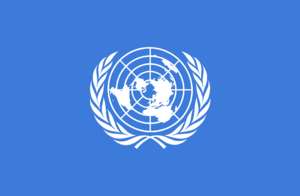United Nations: Difference between revisions
From Halopedia, the Halo wiki
No edit summary |
Forerunner (talk | contribs) No edit summary |
||
| Line 39: | Line 39: | ||
The concept, however, had not been discredited: in 1941 when US President Franklin D. Roosevelt named the Allies the "United Nations", with the name being kept after after the Second World War's end as a peacekeeping organisation comprised of the members of the military alliance. This was a significant time in human history, as it sparked growing tensions between the two superpowers of the time, the [[United States of America]] and the Union of Soviet Socialist Republics, which would lead to the space race and the development of many advanced technologies as part of a technological arms race. Had humanity not endured the Cold War, it is likely that humanity would have been even less prepared for the interstellar age, and the inevitable wars that would follow. | The concept, however, had not been discredited: in 1941 when US President Franklin D. Roosevelt named the Allies the "United Nations", with the name being kept after after the Second World War's end as a peacekeeping organisation comprised of the members of the military alliance. This was a significant time in human history, as it sparked growing tensions between the two superpowers of the time, the [[United States of America]] and the Union of Soviet Socialist Republics, which would lead to the space race and the development of many advanced technologies as part of a technological arms race. Had humanity not endured the Cold War, it is likely that humanity would have been even less prepared for the interstellar age, and the inevitable wars that would follow. | ||
The UN began as an international organization that described itself as a "global association of governments facilitating co-operation in international law, international security, economic development, and social equity." It was founded officially on June 26, [[1945]] after the end of the Second World War at the signing of the United Nations Charter by 51 countries, replacing the previous " | The UN began as an international organization that described itself as a "global association of governments facilitating co-operation in international law, international security, economic development, and social equity." It was founded officially on June 26, [[1945]] after the end of the Second World War at the signing of the United Nations Charter by 51 countries, replacing the previous "League of Nations." | ||
===UN Government=== | ===UN Government=== | ||
Revision as of 15:58, July 30, 2011
| United Nations | |
|---|---|

| |
| Government overview | |
|
Type: |
Diplomatic and Military Organization |
| Societal overview | |
|
Official language(s): |
English (Primary), Arabic, Chinese (Mandarin), Spanish, French, Russian.[1] |
| Historical overview | |
|
Formation: |
|
The United Nations (UN) is an international Earth-based organization,[2] and the predecessor of the UNSC and the Unified Earth Government. By the 26th century, the UN had been absorbed into a branch of the UEG.[3]
History
Inception
The idea of a United Nations system of global governance began in 1920 after the end of World War I. The brainchild of American President Woodrow Wilson, the purpose of the League of Nations was to spark economic development and to keep the peace after the destruction of the war. However, this organization would soon collapse without the support of the United States Congress and growing tensions caused by the Great depression of the early 1930s. Its ultimate downfall came with World War Two, which the League was completely unable to prevent. The concept, however, had not been discredited: in 1941 when US President Franklin D. Roosevelt named the Allies the "United Nations", with the name being kept after after the Second World War's end as a peacekeeping organisation comprised of the members of the military alliance. This was a significant time in human history, as it sparked growing tensions between the two superpowers of the time, the United States of America and the Union of Soviet Socialist Republics, which would lead to the space race and the development of many advanced technologies as part of a technological arms race. Had humanity not endured the Cold War, it is likely that humanity would have been even less prepared for the interstellar age, and the inevitable wars that would follow.
The UN began as an international organization that described itself as a "global association of governments facilitating co-operation in international law, international security, economic development, and social equity." It was founded officially on June 26, 1945 after the end of the Second World War at the signing of the United Nations Charter by 51 countries, replacing the previous "League of Nations."
UN Government
By the time humanity began colonizing the other planets of the Sol system, the nations of Earth were not yet united under a single government, though the United Nations held considerable power over humanity. However, some of the UN's attempts to maintain peace failed as various dissident factions arose in the colonies, resulting in several conflicts in the 2160s, including the Interplanetary War of 2160 - 2164. Following the war, the United Nations gained control over the nations of Earth, uniting them under a common government,[2] the Unified Earth Government - an imperative governance change in order to maintain peace and prosperity among the colonies of the UN.[4] During the conflicts, the UN also developed the United Nations Space Command, a combined military which policed space. The UNSC became the main military body of Earth's "empire".
As far as the 26th century, the UN still existed in a similar fashion to how it was when created, although under ultimate control of the UEG, similar to the UNSC and the CAA. After the beginning of the Human-Covenant War, the UNSC gained ultimate control of the UEG and its branches, including the UN.[3]
